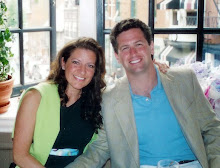Before I begin: In retrospect, could we have just written to Amit Kulkarni - the travel agent recommended by Surrogacy India and mentioned by Shannon - and just trust him entirely to find a suitable hotel? You know what, maybe we could have. His prices were very competitive and he's got lots of happy customers. (In fact, if it wasn't for my ability to get corporate rates through my company, Amit's prices were the best we found.) So for anyone else heading to Mumbai, no shame in starting with Amit. That said, you'll feel a lot better doing your own homework as well. Oh, and Amit only handles the hotels. For flights you're on your own.
- What time is it in Mumbai? Well, if you're on the East Coast of the US, subtract 90 minutes then flip am/pm. When it's 8am here in Boston, the Mumbaiers (I just made that up) are heading home from work because it's 6:30pm. And it's later there - they celebrate the New Year before we do.
- India's currency is the rupee, currently equivalent to a bit more than two US cents; today it's 46.5 rupees to the dollar. The US has a fairly weak currency right now - our English brother-in-law runs around the streets of Boston laughing, British pounds in hand - so even the rupee is relatively strong compared to past history. Why does this matter? Well it means the fantasy of five star hotel rooms at one star prices is just that - a fantasy. It's not as bad as finding an affordable room in New York City either though. And the fun part is you get to refer to daily room rates in the thousands. "My room costs 5000 rupees?!? What, is it covered in gold? Oh, that's only $110 dollars? Never mind...."
- Booking a room in a country you've never been to, a city of 15 million people (that's not a typo) with a heavy mix of the have and have-nots is pretty daunting. Where to look? As Shannon touched on, we favored finding someplace 1) relatively near the hospital we'll be frequenting, 2) in a safe neighborhood (if that's meaningful in such a large city), and 3) near a bunch of restaurants with varied cuisine. We settled on the Hotel Novotel, Juhu Beach. This was not some revelation; the area came highly recommended by other SI patients.
- Reading up on the experience of other travelers - not just those on surrogacy missions - taught us to subtract a star for all home-grown hotels. (A 3 star would be a 2 star by our standards.) For international chains, on the other hand, expect some consistency. From what we could tell, at least on Juhu Beach, the simplest room at a true four star hotel starts at $175 a night, not including tax.
- Little side note that made sense was to reserve the hotel room at a rupee rate, not a US $ rate. Exchange rates change daily so unless you're an arbitrage expert, why gamble and hope the exchange rate doesn't make things more expensive for you?
- Internet access is almost never included in the room price. Worse, it's price tag is clearly meant to milk a captive audience. On average, Internet access costs $18 per day. Some hotels do include it, however, but from what we saw, the nicer the hotel, the less likely Internet access was included. Call it the we-cater-to-business-people-with-expense-accounts maneuver. It's certainly possible that rogue, free WIFI signals can be found drifting through your hotel room but one ought not to expect it.
- Sometimes taxes are included in a room rate, sometimes they aren't, and either way it's never clear. Amit always quoted prices that included taxes. If you're doing this on your own or working with some other agent, make sure you know the story.
- A visa is necessary for entry into India. Think of it this way - a passport identifies who you are, a visa grants you permission to enter a specific country. Traditionally, visa applications were submitted through a country's embassy; India, and a few other countries, now work through a third party, Travisa. There are quite a few different kinds of visas (business, tourist, student, etc.) and validity duration (6 months, 1 year, 5 years, etc.). As a US citizen we could choose from 6 month, 5 year or 10 year tourist visas and settled on the 5 year. That worked out to about $170 per person - not cheap but not negotiable.
- There's a whole bunch of routes from the US to Mumbai, some direct and some indirect. As Shannon mentioned, we let price be a guide - turns out this meant a quick hop from Boston to Newark and then a non-stop on Continental from Newark to Mumbai. All told, about $1000 a head. As luck would have it, going direct was our preference anyway even though it does mean sitting in a petri dish for 16 hours straight. (Some folks might prefer a European layover just to break things up.) We did build a long layover in Newark, however, just to be triple sure our luggage and bodies make the connection. Seems the Boston/Newark flight is often quite delayed.





